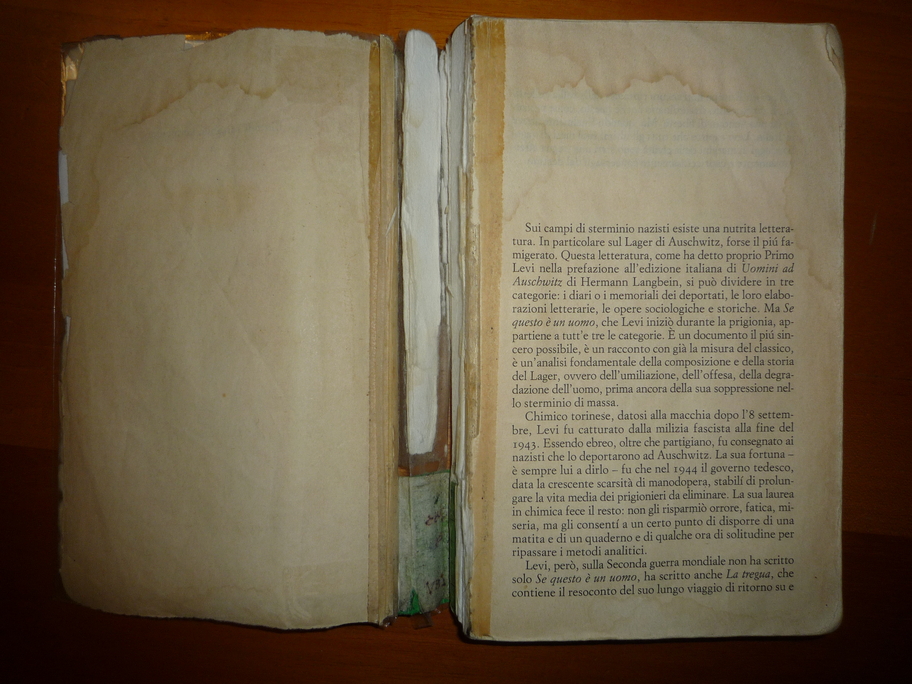Primo Levi explains the importance (and the absence) of ebooks in Public Libraries
67 years ago Primo Levi was deported to Auschwitz. 64 years ago he published a book about that experience titled If this is a man. 24 years ago Primo Levi died. Today Primo Levi reminded me of the absurdity of certain laws and wastes of public money, and how the technology could help culture. Today I met a high school student who, having to read If this is a man to write a report, borrowed in the closest Public Library the copy that you see in these photos.

I respect copyright, I really love reading and I really love paper books. I am lucky enough to have hundreds of them, and if I had enough space (and money, of course) I would have several thousands. Honestly, I think that people who almost never read and/or don’t teach their children to love reading, even when they would have the possibility to do it, give up something very important. Hooray for reading, for all the paper books alive and long live to Public Libraries.

Having clarified this, may I ask how much sense there is sense in a system of public libraries where the loan of paper books is still the rule, not the exception? That copy of If this is a man falls apart and is not particularly clean. In the place from which it came there are hundreds if not thousands of other titles in the same conditions. Rental of premises, utilities and other assorted bills, staff salaries: such a system costs a lot even if it makes available to those who need them only a minimum part of what they might read, if only for reasons of space. In the past I have been forced to send to the recycling dumpster dozens of books that for reasons of space I could not keep at home anymore, simply because none of the libraries (municipal, parish …) within a radius of 10 KM from my home had space for them.
Today there is much talk about electronic books (I mean the actual books that are simple files, not the devices used to read them!), but almost always it’s only about new titles. The photos on this page point out that there is a class of books much, much bigger than that. If all those other, already existing books were freely available in electronic format, they could do so much for spreading the culture in Italy or anywhere else, at a much lower cost than the current system.
A pile of hard drives as big as one yellow pages book costs a few hundred dollars and can hold many thousand titles. A public library that kept everything it can in this format would need much less space and would cost much less, because it could:
- Keep all those titlesalways available to everyone via the Internet
- Loan ebook readers, oor hard copies printed on site if and when someone without computers or Internet connection actually asks to read something already available in digital format
The number of books already published since when the printing press was invented is much greater than the number of new books appearing every year. So why do people only talk about new ebooks, and never or almost never of converting to digital all those that already exist, or to use only (at least when taxpayers pay for them) electronic versions of books that can’t be purchased new anymore?

One of the most important reasons why all these good things aren’t happening yet is visible in these photos. Books like those can not be legally used as I explained without permission (even when it’s impossible to ask it, because the author or publishers cannot be contacted anymore), because they are still under copyright. Even when they’re books published 64 years ago by an author died 24 years ago: the current duration of copyright is ridiculously long, something like 70 years after the death of the author. This is the problem. Compensation for authors is right and important, but here we have something else.
Primo Levi wrote something worthwhile reading even after decades, but today is not he who gains if that book is not yet in the public domain. And the same goes for hundreds of thousands of titles across the mondo. if Public Libraries cost more than they could and are forced to lend moldy books from a very little catalogue, it is also because to switch to electronic versions they should ask permissions and pay fees to people who have nothing to do with those titles. People who did not written, correct, edit, paginate, print those titles, or help them to come to existence in any other way. Is it worth it?
Who writes this, why, and how to help
I am Marco Fioretti, tech writer and aspiring polymath doing human-digital research and popularization.
I do it because YOUR civil rights and the quality of YOUR life depend every year more on how software is used AROUND you.
To this end, I have already shared more than a million words on this blog, without any paywall or user tracking, and am sharing the next million through a newsletter, also without any paywall.
The more direct support I get, the more I can continue to inform for free parents, teachers, decision makers, and everybody else who should know more stuff like this. You can support me with paid subscriptions to my newsletter, donations via PayPal (mfioretti@nexaima.net) or LiberaPay, or in any of the other ways listed here.THANKS for your support!